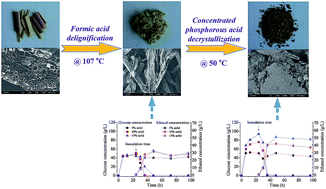Solvent-based delignification and decrystallization of wheat straw for efficient enzymatic hydrolysis of cellulose and ethanol production with low cellulase loadings†
Abstract
Several solvents and ionic liquids, namely formic acid (Formiline process), concentrated phosphoric acid (CPA), N-methylmorpholine-N-oxide (NMMO) and 1-allyl-3-methylimidazolium chloride ([AMIM]Cl), were used to pretreat wheat straw in order to increase cellulose digestibility for ethanol production. When being directly used to pretreat the raw wheat straw under corresponding optimized conditions, the improvement of cellulose hydrolyzability followed the order of CPA > Formiline > NMMO > [AMIM]Cl. However, when Formiline pretreated (delignified) substrates were further post-treated by the above cellulose solvents, the cellulose digestibility was significantly improved particularly with low cellulase loadings. Cellulose solvent post-treatment resulted in deconstruction of hydrogen-bond networking, alteration of cellulose polymorphs, decrease in crystallinity, depolymerization of cellulose chain with dramatic reduction in particle size, thus greatly increasing cellulose accessible surface area. CPA post-treatment showed the best efficacy. Semi-simultaneous scarification and fermentation (sSSF) of a CPA post-treated substrate obtained an ethanol concentration of 41.6 g L−1 with 91.2% of yield at a relatively low cellulase loading (5 FPU per g solid) within 24 h incubation. A biorefining process was proposed based on Formiline pretreatment coupled with CPA post-treatment to achieve a co-production of ethanol, furfural and high-purity lignin, which greatly increases the potential revenue of the process.



 Please wait while we load your content...
Please wait while we load your content...